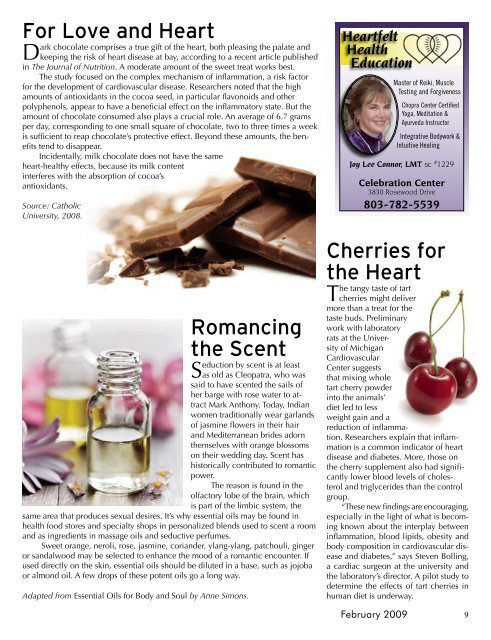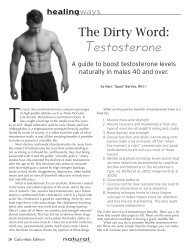soULmAtE - Columbia Natural AwakeningsâHome
soULmAtE - Columbia Natural AwakeningsâHome
soULmAtE - Columbia Natural AwakeningsâHome
You also want an ePaper? Increase the reach of your titles
YUMPU automatically turns print PDFs into web optimized ePapers that Google loves.
For Love and Heart<br />
Dark chocolate comprises a true gift of the heart, both pleasing the palate and<br />
keeping the risk of heart disease at bay, according to a recent article published<br />
in The Journal of Nutrition. A moderate amount of the sweet treat works best.<br />
The study focused on the complex mechanism of inflammation, a risk factor<br />
for the development of cardiovascular disease. Researchers noted that the high<br />
amounts of antioxidants in the cocoa seed, in particular flavonoids and other<br />
polyphenols, appear to have a beneficial effect on the inflammatory state. But the<br />
amount of chocolate consumed also plays a crucial role. An average of 6.7 grams<br />
per day, corresponding to one small square of chocolate, two to three times a week<br />
is sufficient to reap chocolate’s protective effect. Beyond these amounts, the benefits<br />
tend to disappear.<br />
Incidentally, milk chocolate does not have the same<br />
heart-healthy effects, because its milk content<br />
interferes with the absorption of cocoa’s<br />
antioxidants.<br />
Source: Catholic<br />
University, 2008.<br />
Romancing<br />
the Scent<br />
Seduction by scent is at least<br />
as old as Cleopatra, who was<br />
said to have scented the sails of<br />
her barge with rose water to attract<br />
Mark Anthony. Today, Indian<br />
women traditionally wear garlands<br />
of jasmine flowers in their hair<br />
and Mediterranean brides adorn<br />
themselves with orange blossoms<br />
on their wedding day. Scent has<br />
historically contributed to romantic<br />
power.<br />
The reason is found in the<br />
olfactory lobe of the brain, which<br />
is part of the limbic system, the<br />
same area that produces sexual desires. It’s why essential oils may be found in<br />
health food stores and specialty shops in personalized blends used to scent a room<br />
and as ingredients in massage oils and seductive perfumes.<br />
Sweet orange, neroli, rose, jasmine, coriander, ylang-ylang, patchouli, ginger<br />
or sandalwood may be selected to enhance the mood of a romantic encounter. If<br />
used directly on the skin, essential oils should be diluted in a base, such as jojoba<br />
or almond oil. A few drops of these potent oils go a long way.<br />
Adapted from Essential Oils for Body and Soul by Anne Simons.<br />
Heartfelt<br />
Health<br />
Education<br />
Master of Reiki, Muscle<br />
Testing and Forgiveness<br />
Chopra Center Certified<br />
Yoga, Meditation &<br />
Ayurveda Instructor<br />
Integrative Bodywork &<br />
Intuitive Healing<br />
Joy Lee Connor, LMT sc # 1229<br />
Celebration Center<br />
3830 Rosewood Drive<br />
803-782-5539<br />
Cherries for<br />
the Heart<br />
The tangy taste of tart<br />
cherries might deliver<br />
more than a treat for the<br />
taste buds. Preliminary<br />
work with laboratory<br />
rats at the University<br />
of Michigan<br />
Cardiovascular<br />
Center suggests<br />
that mixing whole<br />
tart cherry powder<br />
into the animals’<br />
diet led to less<br />
weight gain and a<br />
reduction of inflammation.<br />
Researchers explain that inflammation<br />
is a common indicator of heart<br />
disease and diabetes. More, those on<br />
the cherry supplement also had significantly<br />
lower blood levels of cholesterol<br />
and triglycerides than the control<br />
group.<br />
“These new findings are encouraging,<br />
especially in the light of what is becoming<br />
known about the interplay between<br />
inflammation, blood lipids, obesity and<br />
body composition in cardiovascular disease<br />
and diabetes,” says Steven Bolling,<br />
a cardiac surgeon at the university and<br />
the laboratory’s director. A pilot study to<br />
determine the effects of tart cherries in<br />
human diet is underway.<br />
February 2009<br />
9







